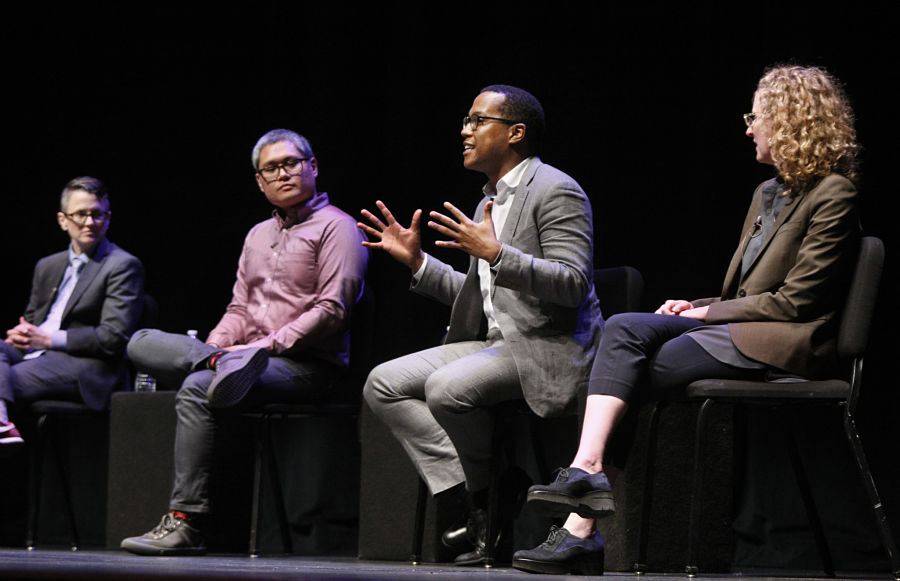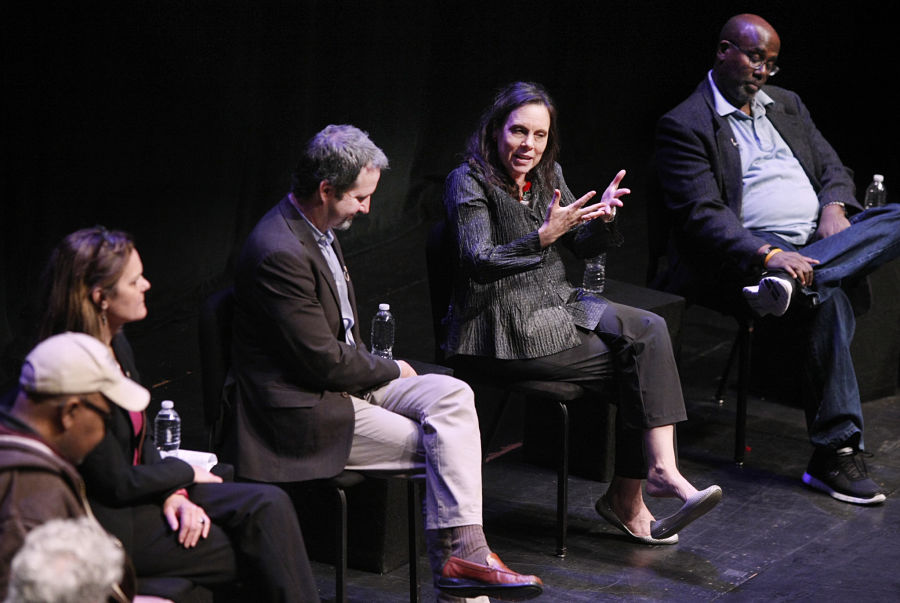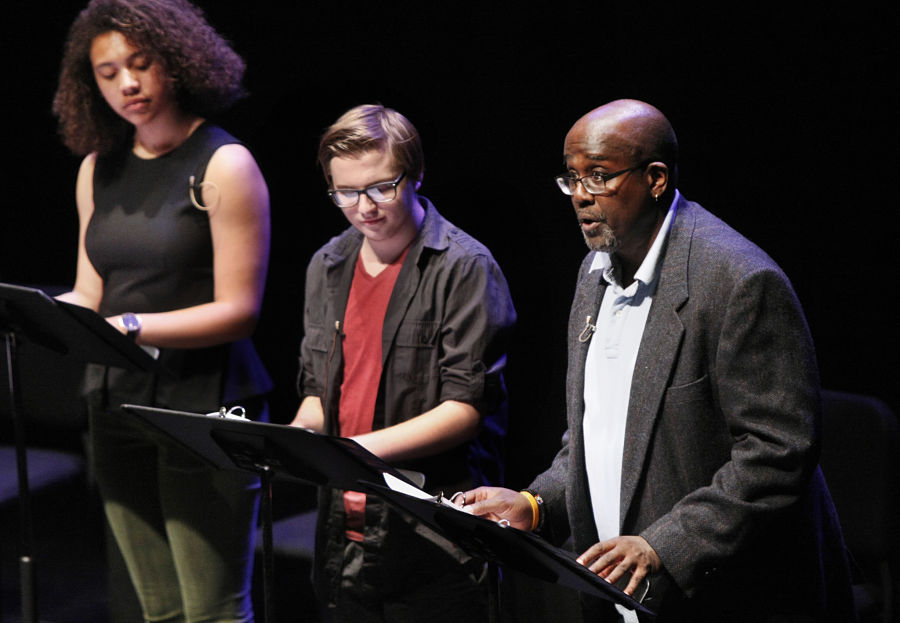PRINCETON, N.J.: Marion McClinton well remembers a night at a bar in the spring of 1996. He was directing a play at the Pittsburgh Public Theatre by his friend and colleague August Wilson, and the two men went for a drink. It was at a Steel City bar, McClinton recently recalled, that the late playwright gave the director a private preview of the speech that would become nearly as synonymous with Wilson’s name as his great 10-play cycle.
“He didn’t want to speak for all black artists or black people, but he felt the duty to say something meaningful,” McClinton said, sitting on the stage of McCarter Theatre Center on Monday, April 18, as part of a 20th-anniversary commemoration of Wilson’s ambitious, passionate, occasionally incendiary artistic manifesto, titled “The Ground on Which I Stand.” The location was the very same theatre where in 1996 Theatre Communications Group held its then-biennial conference (the event is now annual), and Wilson’s 40-minute speech, as TCG’s current executive director, Teresa Eyring, recalled on Monday, fairly upended that gathering.
“It was my very first TCG conference,” said Eyring, who at the time was heading Philadelphia’s Wilma Theatre. “They had to rearrange the whole structure of the conference to deal with the aftermath of the speech.”
In retrospect it’s not hard to see why. Among the many striking qualities of “The Ground on Which I Stand,” heard again all these years later, is its wide-ranging challenge to the status quo; it sounds no less prescient or urgent today, even if many of Wilson’s critiques are by now distressingly familiar. “I believe in the American theatre,” Wilson affirmed near the speech’s end, but that statement only came after a thoroughgoing takedown of a theatre field in which at the time only 1 of 66 LORT theatres was black-identified, and in which, according to Wilson’s diagnosis, subscription audiences, critics, foundations, theatre leaders, and the larger American culture were disastrously failing African-American artists and audiences, not by accident or mere oversight but as a continuation of the nation’s legacy of assault on black bodies and black values. As he put it, “We stare at each other across a divide of economics and privilege that has become an encumbrance on black Americans’ ability to prosper and on the collective will and spirit of our national purpose.”
The picture is now both bleaker and brighter, depending on where you look. Near the end of a second panel discussion on Monday, Playmakers Repertory artistic director Vivienne Benesch happened to bring up the multicultural Broadway phenom Hamilton, and playwright Branden Jacobs-Jenkins joked that he’d been waiting for someone to mention it—an exchange that happened just as news was breaking that Hamilton had taken this year’s drama Pulitzer and Jacobs-Jenkins’s Gloria was a finalist. “The playwrights I’m excited about now, no offense to white men, are all women and people of color,” McCarter artistic director Emily Mann had said on an earlier panel, noting that for this week’s rereading of the speech she made a point of sitting in the same seat as she had in 1996. “ A lot has happened; we have made a lot of progress. August started a lot of the dialogues that many people didn’t even think about having then.”

On the other hand, the landscape for black theatres, let alone for Latino or Asian-American theatres, is by many measures more treacherous now. Eyring pointed out that while there are more LORT theatres than there were 20 years ago, there is not even one in that size range that is black-identified. (Crossroads Theatre Company of New Brunswick, N.J., was the single black theatre Wilson was referring to, and while it is still very much around, it is no longer a LORT theatre.) Other non-LORT theatres of color, including the Penumbra in Minneapolis, have struggled or shuttered altogether.
“I don’t think that much has changed—I feel that a part of something has failed,” said John Dias, artistic director of Two River Theater in Red Bank, N.J. “I don’t think we’ll ever accomplish what August wanted: thriving black theatres and Latino theatres in every city with those communities.” Conceded Eyring: “We haven’t succeeded as a field in investing in theatres of color, both its artists and its audiences. It’s often blamed on communities of color for not being well-resourced, rather than blamed on the whole theatre ecosystem.”
Interestingly, two playwrights at Monday’s panel discussions—which were moderated by Princeton’s dean of the college and professor of English and theatre, Jill Dolan, and assistant theatre professor Brian Herrera—picked up on the economic wavelength in Wilson’s speech. Lisa Kron, noting the tension between the “inherently anti-institutional” work of making art and the need for artists to work with institutions to reach audiences and make a living, talked about the work she’s done documenting gender and racial disparities in theatres’ season programming. “Theatres are made around the personality of the artistic director, and none—or almost none—are programming with the whole field in mind,” she said, going on to suggest that their nonprofit status gives theatres a civic and, yes, a collective responsibility to raise the bar for diversity and inclusion.
And Jacobs-Jenkins, who stressed that Wilson himself was an “economic force” in the 1990s, and that his plays essentially built a bustling infrastructure that employed a generation or two of black artists, also highlighted the nonprofit angle. “I think part of what he was saying is, all Americans pay taxes, and there are black people in these towns,” said Jacobs-Jenkins. “What are they getting for their tax money at these nonprofit theatres?”
Eyring, too, urged artistic leaders to think not only of serving their audiences. “What is the field doing to support its artists?” she asked rhetorically, calling the Wilson speech “prophetic” on a topic that’s surged to the forefront in the 2016 presidential campaign: structural inequality.
Jacobs-Jenkins also mentioned the current political climate in passing, saying that he felt Wilson’s speech is “about nationhood—the actual ground. He’s claiming the country as his. We’re noticing this play out in our election right now: Who is the ‘we’?”
It was remarkable, in fact, that in a speech that begins with the disclaimer, “I do not have a mandate to speak for anyone,” how insistently Wilson used “we” and “our,” by which he mostly meant his fellow African-Americans (“We reject any attempt to blot us out, to reinvent history and ignore our presence or to maim our spiritual product”) but at other points in the speech included all within his hearing (“We can meet on the common ground of the American theatre”).
For Polly Carl, dramaturg and editor of HowlRound, the particularity of the “I” is still of paramount importance. “There’s such eagerness to get to the ‘we,’ but there are still so many ‘I’s left out who haven’t had their stories told,” he said, giving as one pressing example the case of the transgender experience. Playwright A. Rey Pamatmat confessed that he initially dismissed the speech because there was “nothing Asian-American or queer in it,” but rereading it recently found it “so relevant to my career, particularly the inability of critics to allow me to be at the center of my work.”

As urgent as these issues still are, the afternoon gathering was conspicuously tame in comparison to the legendary contretemps ignited by Wilson’s original speech—though there was at least one interesting flareup. When Kron mentioned that Wilson, “for all his precision of language, erased women from his speech,” and Dias remarked, “Oh, don’t get black gay playwrights started on August Wilson,” Kenny Leon—a frequent director of Wilson and artistic director of Atlanta’s True Colors Theatre Company—called out from the audience in protest. And Jacobs-Jenkins later took exception to what he felt was Dias’s dismissive comment.
But in perhaps a sign of how much calmer the commemoration was than the event it memorialized, one of the speech’s most controversial elements—Wilson’s stringent opposition to “colorblind” casting, including the casting of actors of color in classics by Shakespeare or Arthur Miller—was dispensed with quickly. James Williams, who confessed that he missed the original speech because he was in a black production of Death of a Salesman at the time, quipped, “I’m not saying I’m against it, I’m not saying I’m for it. I’m for me working.”
And Mann, who said she considers Wilson America’s greatest playwright, said up front, “I was mad at him about the colorblind casting. I think the only limits in the theatre should be our imaginations, and I wonder if he would agree with himself today.”
That seems debateable. But what is inarguble is that if Wilson, who died in 2005, had attended Monday’s gathering, he would have taken sharp notice of how his old Penumbra compatriot Williams apportioned the reading of his speech: among three white and three black performers. Far from an apostasy, this multicultural casting was true to one startling fact about this historic speech: A phrase August Wilson used more often than the title’s “the ground on which I stand” was “The ground together.”


